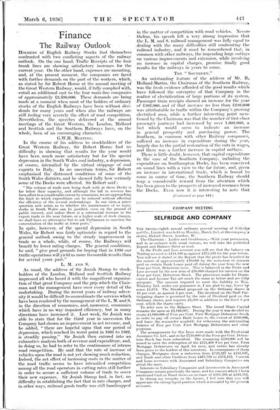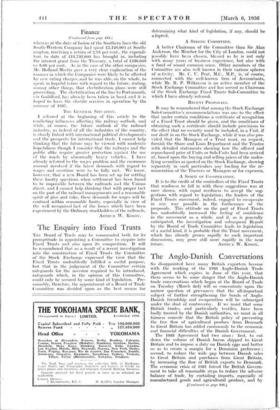The Railway Outlook
Finance
HOLDERS of English Railway Stocks find themselves confronted with two conflicting aspects of the railway outlook. On the one hand, Traffic Receipts of the four trunk lines are showing satisfactory increases for the current year. On the other hand, expenses are mounting, and, at the present moment, the companies are faced with further demands on the part of the workers, which, as stated by Sir Robert Horne at the annual meeting of the Great Western Railway, would, if fully complied with, • entail an additional cost to the four main-line companies of approximately £3,500,000. These demands arc -being made at a moment when most of the holders of ordinary stocks of the English Railways have been without divi- dends for many years and when also the railways are still feeling very severely the effect of road competition. Nevertheless, the speeches delivered at the annual meetings of the Great Western, the London, Midland and Scottish and the Southern Railways have, on the whole, been of an encouraging character.
G.W.R. MEETING.
In the course of his address to stockholders of the Great Western Railway, Sir Robert Home had no difficulty in showing that results for the year would have been much more satisfactory but for the special depression in the South Wales coal industry, a depression, of course, intensified by the virtual stoppage of coal exports to Italy. In no uncertain terms, Sir Robert emphasised the distressed conditions of some of the South Wales districts, and he showed fully how seriously some of the Docks were affected. Sir Robert said :
" The volume of trade now being dealt with at these Docks is far below their capacity, and although the fall in revenue has been offset to a considerable extent by economies, we am approaching the limit to which expenditure can bo reduced without affecting the efficiency of the several undertakings. In our view, a grave question now arises as to whether the maintenance of so many docks in South Wales can be justified,- even on the ground of public interest, and unless there is a substantial increase in the export trade in the near future, or a higher scale of dock charges, we shall have no alternative but to ask Parliament to sanction tho concentration of the traffic at fewer ports."
-In spite, however, of the special depression in South Wales, Sir Robert was fairly optimistic in regard to the general outlook owing to the steady improvement in trade as a whole, while, of course, the Railways will benefit by lower rating charges. The general conditions, he said, " give good grounds for hoping that in 1936 our traffic operations will yield us more favourable results than for several years past."
L. M. AND • As usual, the address of Sir Josiah Stamp to stock- holders of the London, Midland and Scottish Railway impressed all who heard it with the magnificent organisa- tion of that great Company and the grip which the Chair- man and the management have over every detail of the undertaking. During the recent years of railway adver- sity it would be difficult to overestimate the services which have been rendered by the management of the L. M. and S. in the direction of economies, and, moreover, economies which have in no way impaired efficiency, but in many directions have increased it. Last week, Sir Josiah was able to state that for the third year in succession the Company had shown an improvement in net revenue, and, he added, " there are hopeful signs that our period of depression, which reached its worst point in 1981 to 1982, is steadily passing." Sir Josiah then entered into- an exhaustive analysis both of revenue and expenditure, and, in doing so, he had to -refer to the continuance of intense road competition. He said that the rate of increase of -vehicles upon the road is not yet showing much reduction. -Indeed, the net effect of increasing costs in the matter of -the road traffic seems to have intensified competition -among all the road operators in cutting rates still further in order to secure a sufficient volume of trade to cover their new expenses. Sir Josiah Stamp had, in fact, no difficulty in establishing the fact that in rate charges, and in other ways, railroad goods traffic was still handicapped in the matter of competition with road vehicles. Never, theless, his speech left a very strong impression that -the L. M. and S. railroad management was fully equal to _dealing with the many difficulties still confronting the railroad industry, and it must be remembered that, in common with other railways, the impending large outlays on various improvements and extension, while involving an increase in capital charges, promise finally good results for the railways in years to come.
THE " SOUTHERN."
An outstanding feature of the address of Mr. R, . Holland-Martin, the Chairman of the Southern Railway, was the fresh evidence afforded of the good results which have followed the enterprise of that Company in the Matter of electrification of large portions of its system. passenger train receipts showed an increase for the year of £462,000, and of that increase no less than £240,000 was attributable to traffic within the Company's growing electrified area, while a further interesting point men- tioned by the Chairman was that the number of first-class passenger journeys had increased by over 1,000,000, a fact which would seem to indicate an increase in general prosperity and purchasing power. The Southern, in common with other Railway companies, suffered an increase in expenditure during the year, largely due to the partial restoration of the cuts in wages, and there was a further increase in capital outlays.
There is little doubt, however, that capital expenditure in the case of the Southern Company, including the expenditure on Southampton Docks, has been conceived on sound lines with a view to the far future, and, given an increase in international trade, which is bound to come in course of time, the Southern Railway should reap a considerable reward from the attention which has been given to the prospects of increased revenues from the Docks. Even now it is interesting to note that
(Continued on page 444.)
Finance
(Continued from page 443.) 'whereas at the date of fusion of the Southern fines the old South-Western Company had spent /5,128,003 at South- ampton, receiving a return of 2.95 per cent., the expendi- ture to date of £11,732,000 has brought in, including the interest grant from the Treasury, a total of £430,000 or 3.66 per cent. As in the case of the other companies, Mr. Holland-Martin gave a very clear explanation of the manner in which the Companies were likely to be affected by new rating charges, and he was able, on the whole, to speak in hopeful terms with regard to the future, stating, among other things, that electrification plans were still proceeding. The electrification of the line to Portsmouth, via Guildford, has. already been taken in hand, and it is hoped to have the electric services in operation by the summer of 1937.
Tim GENERAL SITUATION.
I referred at the beginning of this article to the conflicting influences affecting the railway outlook, and while, of course, the future outlook of the railroad industry, as indeed of all the industries of the country, is closely linked with international political developments and the prospects for international trade, I cannot help thinking that the future may be viewed with moderate hopefulness though I consider that the railways and the public alike require greater protection against the use of the roads by abnormally heavy vehicles. I have already referred to the wages problem and the enormous amount involved if the latest demands with regard to wages and overtime were to be fully met. We know, however, that a new Board has been set up for settling these knotty questions when settlement has been found to be impossible between the railroads and the Unions direct, and I cannot help thinking that with proper tact on the part of the railroad managements and a reasonable spirit of give and take, these demands for wages will be confined within reasonable limits, especially in view of the well recognised fact of the losses which have been experienced by the Ordinary stockholders of the railroads.
ARTHUR W. KIDDY.

















































 Previous page
Previous page